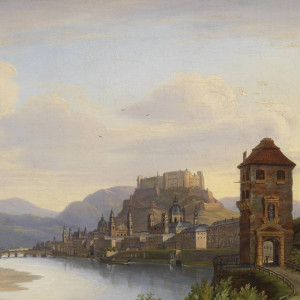Differences on Ecclesia
The Ecclesia religion is the religious belief that there is only a single God, who created the entire world as well as the heavens, for the purpose of judging the souls of the living. Its members are called Ecclesians or Ecclesiastic. The nation of [[Eccles]] has Ecclesia as its state religion.
Those who are members of the faith believe that all other Gods are in fact lower beings falsely presenting themselves as deities to mislead people. By following the tenets of the faith, they can earn a place in Heaven, which is a paradise afterlife, instead of being forced to suffer eternally in the Hells.
The Holy Symbol of the Ecclesia religion is a pair of golden key, the Keys of Ecclesia, which are said to be the key to Heaven, an afterlife where those who are deemed worthy by their one God go after death. The head of the Ecclesia faith, and the nation of [[Eccles]] is [[Pontifex Pious]].
==== Tenets of the Faith ====
Ecclesia does not have different deities, but they do have different [[Saint|Saints]], which form a central part of the religion, in that they are both worshipped and they are key in many of the Ecclesian rituals and prayers. The Ecclesia religion has formalized a lot of requirements that the faithful should follow, and it strongly encourages its followers to stick to those requirements.
A key duty that the faith asks of the faithful is regular attendance to religious services, at least once a week, though more often is preferred. Each of the faithful is registered with a specific church, usually one nearby their place of residence, and those churches hold public services, usually on a daily basis, where the faithful may come to participate. If a person is traveling, it is expected they attend church in the location they are traveling to if at all possible. Those who do not attend regularly may find a priest visiting them for an explanation and if they are found to be ignoring their duties while they would be able to, the church and the community might turn against them, which may cost them business opportunities and friends.
All faithful are advised to pray before and after every meal, together with the others who partake in it. They give thanks to the one true God that there is food to eat and often ask for support with whatever difficulties they may have. Personal prayer is advised before and after sleeping. Unlike with the [[Pantheon of Vorus]], no sacrifices are made, though candles or incense may be burned to create an atmosphere conductive to prayer and contemplation.
Priests are community leaders and are expected to act in the interest of their congregation. They take confessions and offer forgiveness for sins on behalf of the one true God, they offer guidance in decision making and they promote conversion to the heathens, that is, those not of the Ecclesian faith.
Faithful are expected to dress modestly, in accordance with their gender and station. These expectations are not laws and the faithful may deviate, either for an occasion or in general, though this may cause stern looks from priests. Though there are a lot of specifics in obscure Ecclesian writings, in general faithful are expected to meet a few simple rules: only nobles should wear bright colours, everyone should cover their head in public (hats for men and veils for women are common) and showing less skin is preferred over showing more skin.
==== Cults & Heresies ====
// See [[Cult]] //
==== Seven Sins ====
Sins are a key feature of the Ecclesia faith, and avoiding them is key to earning a place in heaven. The Church of Ecclesia recognizes seven primary categories of sin, though sinful behavior may involve aspects of multiple categories.
Usually sins take a shape where a person places their own interest over that of the community. For example, envy, gluttony and greed are categories of sins where a person wishes, keeps or takes for themselves that which belongs to or should be shared with others. Sloth involves negligence with ones duties or laziness, which in turn may harm the community. Other sins, such as pride, involve thinking oneself better than the community, while wrath involves damaging the community in ones own interest (it is perfectly acceptable to be wrathful against the enemies of the community). Lust is a special case in that it does not harm the community physically, but rather spiritually as others are drawn in by lustful behavior and fall into sin themselves.
==== Saints ====
Below is a list of saints worshipped by the Ecclesians
[show]
Saints:
[/show]
==== Relations with other Faiths ====
According to Ecclesia, all other faiths are wrong. More than that, they are conceptually evil and deceptive, using false pretences that may even fool their own priests to corrupt individuals away from the one true God and lead them to sin. Thus, while there exists, for example, a being called [[Aex]], this according to Ecclesia is not actually a deity, but a demon in disguise.
To help those who have fallen victim to false religions, the faithful are expected to work to convert, thereby saving the eternal soul of those who have been deceived by false gods.
Naturally these beliefs have not gone over well with those not of the Ecclesian faith, placing the religions at odds with one another.
==== Religious Presence in the city of Duirt ====
Ecclesia is the state religion of [[Eccles]] and it forms a key part of their government. As such, there are many chapels and shrines devoted to Ecclesia and the saints in the [[West Quarter]]. Key sites include the [[Cathedral]], the [[Church of Saint Molina]], the [[Three Saints Healing Houseall]] and the [[Chapel of Saint Theris]].

